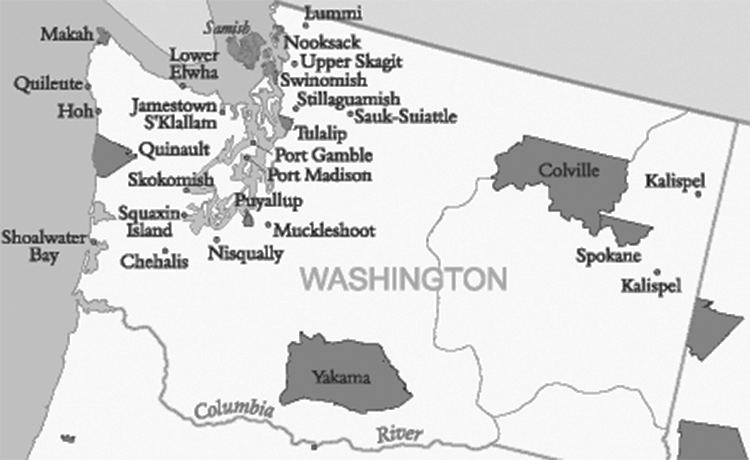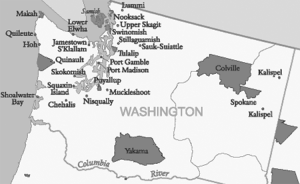
By Keely Coxwell

“Often within a dominant United States society there is a thought that Native Americans are people of the past, that they really represent something backward-looking,” Doug Sackman said. “They are not only a people of the past; they are of the present and have some lessons [and] perspectives that are helpful.”
According to the University of Puget Sound website, Sackman is history professor who focuses on environmental, Native American, Western and Pacific Northwestern history.
“In a world of untruths and confusing realities walking in autumn is universally objectively perfect,” Danica Sterud Miller said. Miller is a professor of American Indian Studies at the University of Washington and a member of the Puyallup tribe.
On Monday, Oct. 23, Miller gave a talk in Wyatt 109 to about 30 people as the last talk in a three-talk series on Native American writers and scholars. She spoke on the the power and identity of the Puyallup people.
“I really wanted to have her voice on campus … to hear her as a scholar and also really wanted to build more understanding and relationships with the Puyallup people,” Sackman said.
“I always think it’s interesting to hear history from a different perspective rather than the traditional white narrative that is taught in schools,” Kara Ashpole ‘21 said.
Miller opened the talk by discussing the specific challenges with colonists that the Puyallup people faced.
“For the Puyallup, we are a clan people. We were small groups of people with hunting and fishing rights who have very specific responsibilities and land lordships along the Puyallup river,” Miller said. “The colonists didn’t know who they were dealing with. The Puyallup were small bands of people, which is different from the tribes in the east which had more centralized governments that were similar to governments that the colonists knew.
“The name Puyallup basically means ‘people who are generous,’ and generous not only in the sense of welcoming but also sharing ideas about how to live in a place,” Sackman said. “I see Puyallup at the forefront of some local environmental issues.”
Miller’s talk largely looked at how the Puyallup used and currently define sovereignty by going through the history of the Puyallup from colonization to now.
“By 1911, Puyallup land was almost entirely sold through a type of performance of selling,” Miller said. “We have so many records of titles being sold to the reservation agent’s cousin. It was such a manipulation of their role and showed how little the Puyallup actually owned their land.”
“In the 1950s things got more racist, or more dangerously so,” Miller said. “Puyallup started getting arrests for fishing. They would be beaten, they were having their nets torn, they were just feeding their families in the best way they knew how. These ‘fish wars’ went on for 10 years.”
The fish wars turned into activism, “as everything did in the 60s,” Miller said. Marlon Brando came to Washington to be arrested for fishing with Puyallup to show his support and draw media attention to the protests.
“Regaining the right to fish was more than just kind of a pastime because of the role of salmon culturally and economically to the Puyallup people and others,” Sackman said.
“In US v. Washington, the federal government, on behalf of the tribes, sued Washington state for their fighting treaty rights. The Boldt decision [in 1974] determined that 50 percent of the catch would go to the tribes,” Miller said. “This was a really big deal but the state basically said, ‘absolutely not.’ They refused to enact what Judge Boldt ruled.”
“The Puyallup were able to manipulate this Western construction of sovereignty to then advance their ancestral ownership,” Miller said.
“Sovereignty technically means the ability of a people to govern themselves, and our United States legal system recognized Native groups as sovereign entities, so there is kind of a technical and political sense to it, but there is a cultural sense to it as well, regaining power and standing,” Sackman said. “I would say that the groups have been working really hard at that; they’ve kept things alive.”
Miller closed the talk with a discussion on the revitalization of the Lushootseed language.
“Part of the context of this is there were United States government programs that worked very hard to stamp out Native languages in the 19th and 20th centuries … and promote 100 percent assimilation. Since the 1970s you have seen a re-attempt to bring those languages back and make them open to more and more speakers,” Sackman said.
“Up until this point the only Lushootseed immersion was down at University of Oregon, which was problematic for a lot of Puyallup speakers; they can’t just go to Eugene for two weeks,” Miller said. “Set up something similar at University of Washington, Tacoma.”
“One of my cousins who never spoke [Lushootseed] before by day five [of the program at University of Washington, Tacoma] just started weeping and he said, ‘I just can’t believe what I lost but I can’t believe what I am gaining now,’” Miller said. “Language revitalization becomes a part of decolonization, becomes a part of taking back and healing.”
“I really liked how they [place] Lushootseed in a modern context,” Ashpole said. “They teach them how to text and use modern terms but translated.”
Miller kept the talk light by adding in humor when possible through stories, some of which focused on her father Bill Sterud, who is the Chairman of the Tribal Council.
“If you step back and look at it and consider that the Puyallup and their ancestors have been in this place for at least 5,000 years and are still here now and are taking active leadership that maybe the rest of us should pay some attention to that,” Sackman said.
